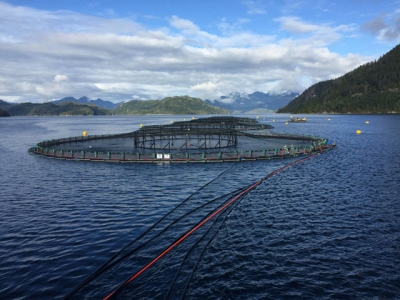Its complicated – reviewing the use of essential oils in aquaculture

Researchers have determined that essential oils can be successfully used as anaesthetics, antimicrobials and antioxidants in aquaculture, but more information is needed in order to make species-specific and dosage recommendations for their use.
When fish experience prolonged stress, their growth, reproduction and well-being can be negatively impacted© Grieg Seafood
A recent literature review in Frontiers in Physiology has examined the role essential oils can play in reducing stress levels in farmed fish. Though the literature indicates that certain essential oils can improve fish welfare and have fewer side-effects that synthetic treatments, more research is needed in order to make evidence-based recommendations and ensure they are used safely.
In fish, prolonged biological stress has been associated with lower levels of well-being, predisposition to disease and mortality. Unfortunately, many aquaculture practices can cause stress in fish. Evidence suggests that handling, confinement, fertilisation and transportation can cause stress reactions in various species. In light of this, researchers have assessed whether anaesthetics and sedatives can alleviate the stress fish experience during intensive aquaculture practices.
Research has demonstrated that introducing essential oils (EOs) to farmed fish (either through dietary exposure or through water) can improve health and growth rates. Since some EOs have analgesic and sedative properties, they have been used as an alternative to other medical and non-medical treatments. This research has demonstrated that the oils are not aversive to the fish, and in some cases, have fewer negative side-effects when compared to synthetic compounds. However, very little research has focused on their ability to reduce stress levels in target species.
The review in Frontiers concluded that handling and transport-related stress can be reduced by EO supplementation. However, the authors were quick to point out that the effects of EOs are highly variable. The positive effects could change depending on the oil’s chemotype, the place of collection, the climate they were used in and the dose. In addition to these concerns, essential oils are highly volatile. They can easily decompose, and lose their effectiveness when exposed to oxygen, light, heat or humidity. Therefore, the authors recommend using high-quality EOs that have genetic homogeneity.
Information regarding species-specific doses or what happens when EOs are used in combination is scarce – meaning that it is difficult to give concrete recommendations on how EOs should be used in practice. The researchers concluded that further practical and economic trials are needed before EOs can fully replace current health treatments for farmed fish.
Có thể bạn quan tâm
 Pangasius price slumps, farmers suffer serious loss
Pangasius price slumps, farmers suffer serious loss Slump in price of material pangasius in many prefectures of the Mekong Delta has made farmers suffer from 2,000-3,000 dong/kg loss.
 Big Data dividend?
Big Data dividend? Big Data solutions in aquaculture could revolutionise the industry, making it safer, easier to manage and more productive
 Spanish researchers seek to find value in aquaculture waste
Spanish researchers seek to find value in aquaculture waste New study aims to identify ways to extract value from wastes generated by aquaculture.